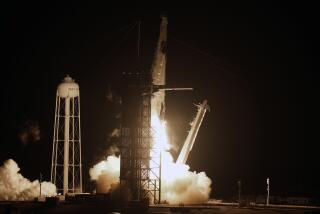Satellite Makers in U.S. See Modest Impact From Pact
- Share via
American commercial satellite producers stand to gain only modestly in the near future from an agreement reached Tuesday aimed at opening the Japanese satellite market.
But the accord could have far-reaching benefits that will allow U.S. producers to maintain their dominant world position in the face of a concerted Japanese push to become major producers of commercial satellites.
The most significant effect of the agreement will be in stripping Japanese firms of the shelter they have enjoyed in their protected home market and allow U.S. producers to embed themselves in Japan before the domestic industry there becomes dominant, according to John Koehler, vice president at Hughes Space & Communications Group in El Segundo, the main U.S. producer.
“The agreement will have an effect, but you have to think about it carefully in assessing its size,” Koehler said. “It is not an enormous piece of business. But more importantly, it eliminates the shelter that Japanese firms have enjoyed.”
Ford Aerospace executives said the “benefit is negligible” and that they did not see a pressing need for the agreement.
“I don’t expect this to increase or decrease our sales there,” said Christopher F. Hoeber, director of Ford’s commercial space operation in Palo Alto. “We have been successfully doing business in Japan for 20 years. Last year, four American-built satellites were launched by Japan. We had 100% of the business, so how are you going to increase that?”
Moreover, Hoeber added: “I feel firmly embedded in Japan now. I don’t think we needed the government action to protect our interests. This agreement was not something that was pushed by industry.”
The world commercial communications satellite market has sales of roughly $1.2 billion to $1.4 billion annually, of which the three main U.S. firms capture about $1 billion. European firms hold most of the balance and the fledgling Japanese producers are regarded as non-competitive.
Los Angeles-based Hughes Aircraft holds roughly one-third of the world market, followed by General Electric and Ford Aerospace.
Since 1972, Japan’s policy has been that any satellites for public sector use must be supplied by a Japanese prime contractor, which in turn has subcontracted most of the work to U.S. firms. Under this arrangement, Mitsubishi Electric subcontracted to Ford Aerospace for the production of communications satellites, Toshiba subcontracted to General Electric for broadcast satellites and Nippon Electric subcontracted to Hughes for weather satellites.
Slowly, the Japanese industry has increased its content of those satellites, but the spacecraft produced by Japanese aerospace firms are regarded as underpowered and without adequate capacity.
Apart from the public sector satellites, however, a decision to privatize Nippon Telephone & Telegraph Co., or NTT, in 1984 opened the private sector market for satellites to U.S. suppliers, experts say.
Hughes was able to establish a position in Japan by taking a 30% ownership position in a consortium called Japan Communications Satellite Corp. and supplied two Hughes-produced satellites to the company, which sells satellite communications services. Ford was also able to supply two satellites last year, but one of them was destroyed when a French launch vehicle blew up.
The Hughes operation was so successful that NTT ended up leasing communications capacity from the consortium. Without the accord reached Tuesday, U.S. producers were concerned that Japan would compel NTT to buy its communications capacity only from Japanese suppliers when the next generation of Japanese satellites is developed.
Japanese firms are developing a satellite, known as the CS-4, that is expected to be the first Japanese communications satellite with capabilities even partially competitive with U.S. spacecraft.
“They have the capability of coming reasonably close to our technical capability, but at a much higher price,” Koehler said.
More to Read
Inside the business of entertainment
The Wide Shot brings you news, analysis and insights on everything from streaming wars to production — and what it all means for the future.
You may occasionally receive promotional content from the Los Angeles Times.










